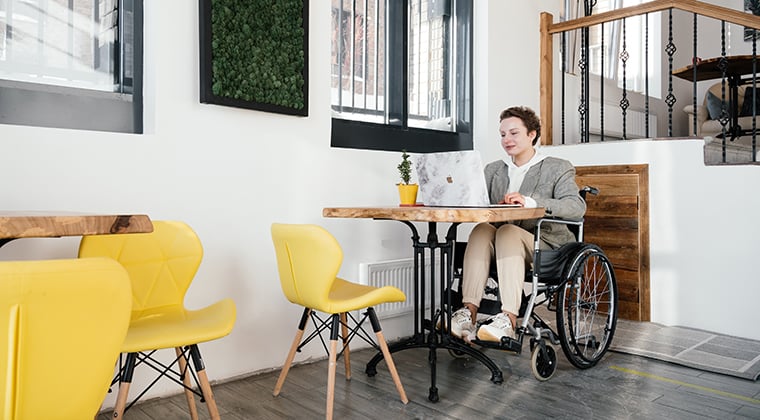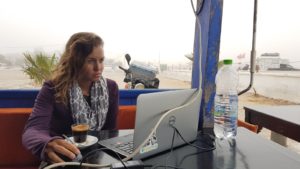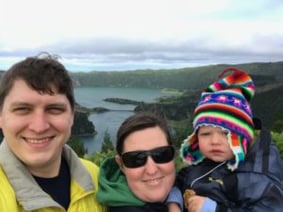How to Work Remotely and Travel the World

Remote work brings many notable benefits. However, we’d be unrealistic if we didn’t admit that working from anywhere in the world has its challenges. Those who frequently travel for work often struggle to communicate and interact with team members in different time zones and can struggle to complete their workloads with the attraction of exciting new scenery.
At HiringThing, a few of our team members have unique remote work lifestyles. We spoke with Ciara Tejani (Business Development Director), who spent the bulk of 2017 traveling the world, and married couple, Alex Luke (Principal Engineer) and Colette Luke (Product Manager), who've traveled with their two young children to Oregon, Alaska, and Portugal.
This article will explore the biggest challenges of working from different time zones, how these three employees succeed as workplace leaders, tips for other remote work travelers, and a few of the best and worst places they've traveled. Let’s dive into the remote work lifestyles of Ciara, Colette, and Alex!
The Most Challenging Parts of Working from Different Time Zone
According to Ciara, finding balance and a normal sleep schedule can be difficult. She noted that trying to unwind after finishing work at 2:00 a.m. is difficult but, ultimately, worth it. Staying connected and available is also challenging, she said, especially when hiking, taking a ferry, etc. However, collaborative tools like Google’s Project Fi and Slack make it easy to remain accessible and looped in to what’s going on at work.
Colette had a similar response, noting that some time zones just aren’t sustainable.

“We try to keep an overlap of 8:00 a.m. to noon PST, and, for a lot of places in Asia, that’s 12:00 a.m. to 4:00 a.m. We currently have no plans to try an extreme time zone," Collette said.
Alex mentioned that for him, the most challenging part of working from different locations is maintaining a good level of comfort.
“A lot of the places we’ve visited haven’t been very comfortable, and the Wi-Fi has been pretty spotty. Overall, it’s difficult working with unpredictable work conditions.”
Colette agrees with Ciara that the challenges are certainly worth it.
“So far, there have been more benefits than challenges. With only needing to overlap by four hours with a specific time zone, we’re free to vary the local time of the day we work to meet the needs of our family.”
There are many options to offset the bumps, such as waking up early, staying up late, or splitting work hours. Working at times during which the rest of the company is sleeping also facilitates great personal productivity.
How to Balance Travel as a Workplace Leader
Ciara feels that it’s very important to prioritize business needs over travel desires.
“There were plenty of times when I wanted to join a group or go exploring, but understanding my priorities was vital. I recall missing a fun adventure with friends in Greece because I needed to be on conference calls, but thankfully, I don’t regret that choice. Leading a team from abroad was a great learning experience, and it was empowering to know I was taking steps forward in my career. It required me to slow down my travel — to stay in places longer so that I could accomplish my personal goals while achieving professional objectives.”
Colette’s experience is much different, as she and Alex have two small children.
“The biggest family challenge for time zones that aren’t extreme is trying to keep important bonding times from conflicting with working hours and meetings and to overlap a large chunk of child-awake time with non-work time. Since we’re both working so much, we try to do a bedtime (either nap or evenings) and at least one family meal. We also love having mornings available for ‘adventures.’ Kids are far more pleasant and able to handle morning activities than evenings.”
Colette’s and Alex’s remote lifestyle allows them to take full advantage of all that travel has to offer. It also allows time to move more slowly than when they have to work regular 9 to 5 schedules. However, balancing a work team and a family is difficult, regardless of the time zone.
“As a manager, it’s the norm to work long hours and be available consistently. Especially with both parents working for the same company, busy times or things like our annual company retreat make it very hard to cover for each other. We negotiate who gets to keep working after hours or on weekends when necessary (and it usually is). I don’t think traveling makes this any more or less challenging. Working from home often adds a helpful flexibility to the situation. For example, I can pump during conference calls, and no one is the wiser,” Colette explained.
Tips for Other Remote Work Travelers
Ciara encourages remote work travelers, as well as people interested in traveling more for work, to stay strongly connected to their teams.
“Morocco was beautiful, but its internet was spotty. Be sure to get on a routine for work, sleep, and exploration that suits your business and personal needs. Consistency dramatically helps boost productivity. If you can’t manage to shift your work schedule, consider same-time-zone options.”
 Additionally, Colette recommends developing an effective plan for travel, including prepping early with children.
Additionally, Colette recommends developing an effective plan for travel, including prepping early with children.
“Travel on Fridays or Saturdays so you don’t have to jump straight into work on Monday. Alex and I use Airbnb and love it, but we look on VRBO, too. Book long-term accommodations about four to six months in advance (you can usually cancel for free a month ahead). Always contact the host and see if you can get a discount for long stays (even if they have a monthly rate, they will often go lower). Book air travel two to four months in advance for international travel. Be flexible about where and when you travel for the best prices.
“Also, start prepping your kid(s) ahead of time so they understand the new situation. Show pictures of the house, tell them what fun things there are to do in the new location, and explain the new schedule and routine that will come with the move. Get them excited and involved in the process as much as possible for their ages.”
Alex added that keeping comfort in mind is also important.
“Try to strike a balance between traveling light and bringing necessary comforts.”
Our Team's Favorite and Least Favorite Places to Travel
Of course, with consistent travel, you’ll find both places you love and places you would never visit again. When reflecting on the best places she has traveled, Ciara leaned toward Kuala Lumpur in Malaysia, Eastern Europe, and Thailand.
“Kuala Lumpur offered the fastest internet speeds and plenty of nightlife for winding down after work, while ensuring there was plenty to explore during the day. I loved my workspaces in Eastern Europe and Thailand. They made it easy to be a remote worker.”
As far as enjoyable work environments, Colette and Alex loved the Azores in Portugal.
“The Azores were fantastic. The internet was decent enough (but not great). Housing and living expenses were super affordable, so we could afford a huge house with workspaces and plenty of room to escape with the kids. It was rural, so we had a huge yard/patio with ducks, geese, and chickens. There were hot springs all over, which was great for swimming with small kids who tend to be cold in pools. There was lots to see and do but nothing was hectic, and we didn’t feel pressured to do structured activities.”
On the other hand, Ciara mentioned that working from Bali and Australia was rather difficult.
“My least favorite destination was Bali, even though it boasts a great remote work culture. The beaches and reefs in Ubud and Canggu were highly polluted and depressing. The time zone difference in Australia was very difficult.”
Colette had a different take on work environments.
“Apartment living in large cities with very small kids is a bit more stressful but offers tons of opportunities not available in more rural areas. Last year, when I was very pregnant, we did Lisbon and Athens with our daughter Cora. Both cities were awesome, but we had to allocate time for getting around and dealing with car seats, strollers, buildings without elevators, or buildings with elevators so small they didn’t fit the stroller.”
A Peek Ahead
Although Colette and Alex haven’t been traveling with their work for very long, they have plenty of support from family and friends, as they have home bases in both Alaska and Portland, Oregon. They’re excited to try Latin America, as the weather, time zone, internet speed, cost of living, and tourist activities are ideal for their family.
Ciara has recently slowed her travel adventures a little, purchasing a home in Buffalo, New York. She still plans to explore but is happy to have a home base where she can always return.
After reading the experiences of these three HiringThing team members, we hope you have better insight into what it’s like to travel with work. Although it comes with particular challenges, traveling the world and experiencing new and different cultures is undeniably rewarding.
The HiringThing Remote Work Hub
HiringThing is a fully remote company, and we’ve crafted our own work environment. Gain some insight into what makes us tick by reading our remote work manifesto.
About HiringThing
Approachable and adaptable, the HiringThing platform empowers everyone, everywhere, to hire their dream team. Try HiringThing’s easy-to-use, feature-rich applicant tracking system with a free 14-day trial today!




